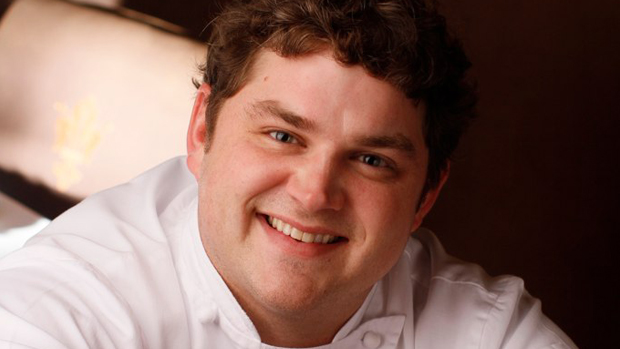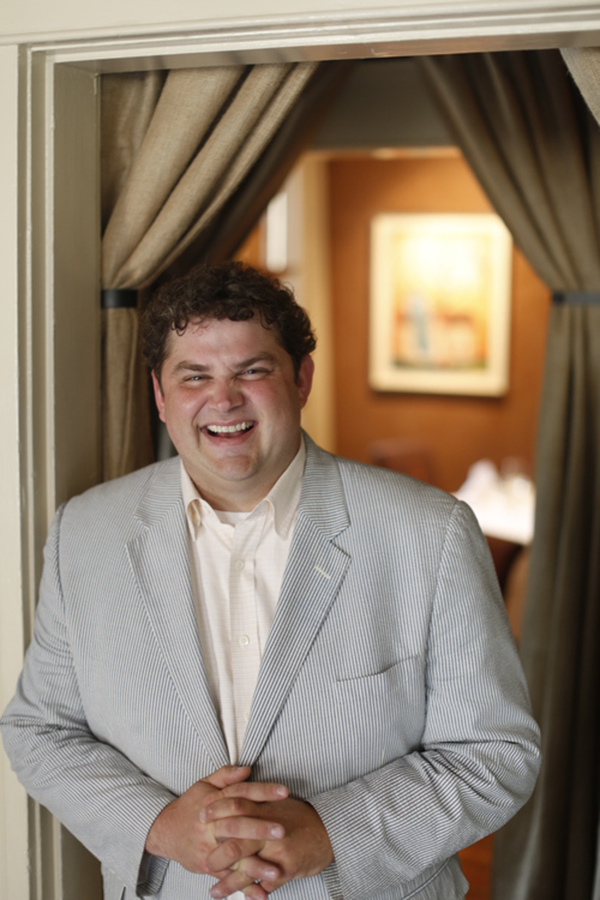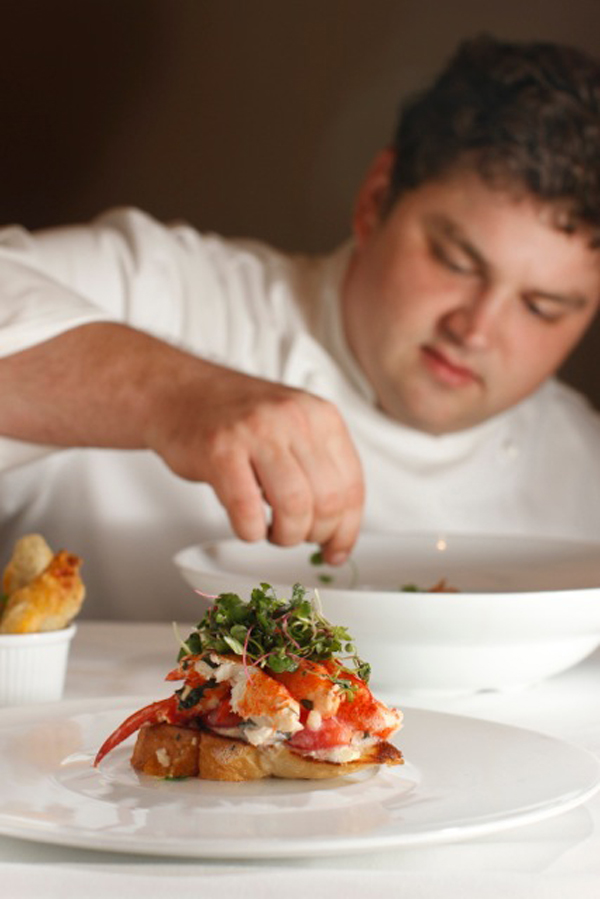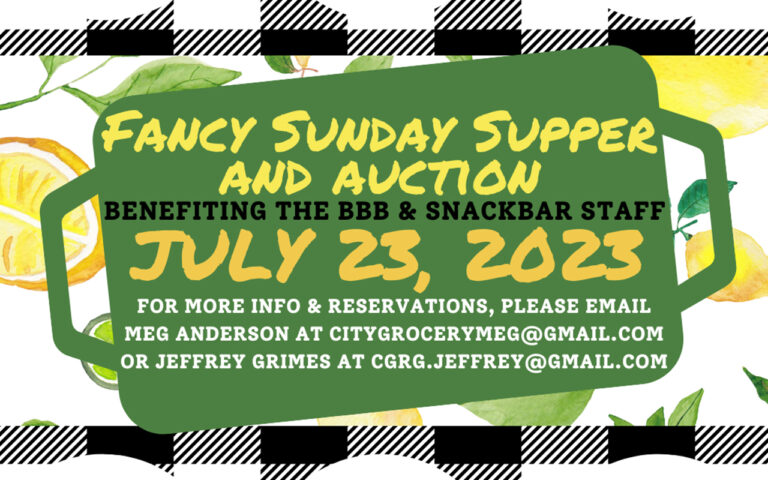
If everything had gone according to plan, Chef Kelly English (owner and proprietor of Oxford’s Second Line) might have been more likely to be litigating, rather than presiding over one of Oxford’s most exciting new menus featuring authentic po’ boys, an emphasis on Gulf seafood, and comfort-food sides such as cheese grits, stewed beet greens, and his legendary “fancy ass cole slaw.” English hails from what he describes as an “eating family” in his native Southern Louisiana – although the first trained chef in his family, it is clear from talking to English that he has been immersed in food culture from a young age.
“And not just food,” he explained to me, “but presenting something that you’re really proud of to people that you care about at your family table. That’s what we try to do at everyone’s table when they come [to Second Line]. We try to really let it come through in the food how much we love what we do.”
However, when he first came to Oxford nearly twenty years ago, it was not to pursue this culinary passion, but rather to study pre-law at Ole Miss. He worked as a cook in local restaurants to help pay his way through college and, as so many people do around here, had an epiphany while filleting catfish in a little shack: “I realized I liked going to work more than going to school,” English explained in a 2009 Food & Wine interview. His father, a lawyer in Louisiana and something of a foodie in his own right, was supportive of the decision: “…He was really excited about it. In his business, everyone is unhappy; I liked the idea of making people happy.”
English and his father celebrated the career change at John Besh’s Restaurant August in New Orleans. Then English departed to study at the Culinary Institute of America in New York, also studying abroad in France and Spain. He graduated at the top of his class in 2004, and returned to Louisiana to hone his skills under John Besh’s tutelage. English fell in love with Memphis shortly thereafter, upon traveling to Tunica to head up one of Besh’s restaurants there. He made his move to the Home of the Blues official in 2007 and acquired the property that was to become Restaurant Iris, his celebrated French-Creole fine-dining establishment in Midtown. The original Second Line followed shortly thereafter, located right next door to Iris, and in 2014, English opened Magnolia House in Biloxi’s Harrah’s Gulf Coast Casino.
We caught up with Kelly English via phone as he presided over another busy day with his staff at Restaurant Iris.
I understand you grew up in southern Louisiana. What are a few things that always remind you of where you grew up?
You know my baseline has always been a roast beef po’ boy. We try to do that exactly to memory at Second Line. It’s a really special sandwich to me.
That leads in to my next question nicely. Is there any food you can remember first falling in love with, or developing an interest in food based on any particular experience?
I have two first food memories. One of them is in Lafayette, during Mardi Gras. I’m not gonna say lesser, I don’t wanna put it down, but it’s not New Orleans, you know what I mean? It’s a little more laid-back, it’s not so glitzy. But it’s a great time. I remember I was a kid there with my dad. It was big, I remember that moment. Then, I remember going to a restaurant with my grandmother in New Orleans called Del Monaco. It was the first time I had really ever eaten at a fancy place. We ordered turtle soup, and I was a little boy, and I thought “Friggin’ turtles?! This is awesome. Like, I’m cool with this. I mean, turtles!” So those are my two firsts.
Was there a first person who taught you to cook as a kid?
My father and my grandmother. My grandmother on both sides actually, but mostly on my dad’s side. Those are the people that have given me my structure and my foundation, and my appreciation for food.
Was there a specific moment when you realized that you could turn your love of cooking into a career?
I was at Ole Miss. I worked in kitchens for a while. None of which are still around. I moved to Barcelona for a semester, and that’s really where I fell in love with food. The idea of doing this for a living came about there.
I understand you started out as pre-law, correct?
I was a pre-law major, and a Southern Studies major. Then I went into Hospitality Management, which back then was Family Consumer Sciences. Which is a fancy way to say ”Home Economics.” I have a degree in Home Ec. So, if you need me to sew your apron, I can probably do that too.
I might call you later, I’ve got some jeans I could use taken in. So, what inspires you to be a chef?
A lot of things inspire me. And I don’t mean that to sound too esoteric. I could go to another restaurant and be inspired. I could meet somebody that I really just want to be with and think about what I would cook for them. There’s a lot of different things that inspire me.
What do you make of the increased popularity of Southern cuisine on a national level for the past 20 years or so?
I think one of the cool things about Southern cooking is it’s so strongly and deeply rooted in tradition, but we’re always looking at ways to push forward. If you look at Southern cooking, it’s actually pretty interesting. Just as most other cultures, the food that has survived and the food that we equate with ourselves and our region, when we think about Southern food, we think about things like… Well, let’s just take greens for an example. Greens came about because people that owned plantations gave their slaves the lesser cuts of everything. They kept the turnips for themselves, and gave the tops to the slaves.
They kept the pork chops for themselves and gave the slaves the ham hocks, and said, “Figure it out. Make something good.” And that’s the food that’s survived—it’s not turnips and pork chops. It’s greens. That’s what we think about when we think about Southern food. It’s something delicious, out of something that somebody thought was waste. That’s the story of our South, to me.
There’s something about creating a sense of home in really good cooking.
Sure. I mean, in most instances it’s not the food of the kings that we eat, it’s the food of the peasants and the everyday folk. We don’t eat the food of royalty—I’ve got this old cookbook that’s recipes from the different royal eras of France, and nothing has survived. Certainly there’s fancy food, but it’s all rooted in the food that everyday people eat.
So as you take something that starts out as a regional cuisine, and move it geographically a little further from its background, what’s your secret to maintaining authenticity?
[Often] we’ll take our ingredients and do something new with them. Or we’ll take ingredients that we aren’t used to seeing every day, and we’ll do what we do know with them. So there’s a lot of fun to be had, to blur those lines a little bit. [With] markets and availability, everyday things become more global. So it’s just a really fun time to cook. It’s a fun time to tell a story through what you put in a pan. And I like other people’s stories as much as I like my own. I think there’s always a bleeding of culture from one place to the next. I mean, hell, I think our culture changes everyday in the South. You know, a new family moves into a new community, and suddenly that community has a new culture to it, and a new flavor. If you’re really telling the story of the South, it’s not just the old South that you’re telling the story of. That’s merely a part of it.
How did you choose Oxford as the location for your new venture?
When I went to school here, about the third day that I was here, I realized how much I wanted to be a part of that community again in my life, when I was a grownup. When that location came about, we jumped at the opportunity. I thought we could be a part of something really awesome. It was kind of a no-brainer.
Do you approach Oxford differently, from opening a restaurant in Memphis or Biloxi?
It’s all about good food, good people, treating people that work with you in an appropriate manner, and giving your all to the people that are coming in. Oxford is a special place, it deserves special attention, and we’re glad to be a part of it. Now I get to spend as much time as I want to in Oxford.
Do you notice any big changes in Oxford since you went to school here?
Anyone can leave for a year, come back, and notice big changes in Oxford. I remember when I was there, Jackson Avenue was one lane each way. Any area, you can come back to and say, “Look how different it is.” Certainly, it’s grown a ton. But it’s the same town, it’s the same spirit. You stop and talk to somebody on the street, and nobody’s in a hurry to move on, no matter how much they’re in a hurry. It’s a great place. ![]()


